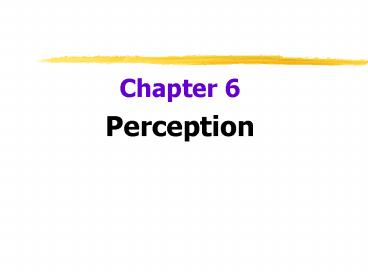Perception PowerPoint PPT Presentation
1 / 15
Title: Perception
1
- Chapter 6
- Perception
2
Perception
- How do we create meaning out of sounds?
- Selective Attention
- focus of conscious awareness on a particular
stimulus - Focus awareness on limited area of experience
- Cube
- Sitting in chair
- Cocktail Party Effect
- Change Blindness
3
Perceptual Organization Visual Capture
- Visual Capture
- tendency for vision to dominate the other senses
- Sound of film seems projected from screen
- We compensate for distorted vision
4
Perceptual Organization Gestalt
- Gestalt--an organized whole
- tendency to integrate pieces of information into
meaningful wholes - tendency to filter information infer perception
so it makes sense
5
Perceptual Organization Gestalt
- Grouping
- the perceptual tendency to organize stimuli into
coherent groups - Grouping Principles
- proximity--group nearby figures together
- similarity--group figures that are similar
- continuity--perceive continuous patterns
- closure--fill in gaps
- connectedness--spots, lines, and areas are seen
as unit when connected
6
Perceptual Organization
- Figure and Ground--organization of the visual
field into objects (figures) that stand out from
their surroundings (ground)
7
Perceptual Organization Depth Perception
- What is Depth Perception?
- ability to see objects in three dimensions
- allows us to judge distance
- Babies have this visual cliff
8
Perceptual OrganizationBinocular Cues
- How do we see depth?
- Binocular cues
- retinal disparity
- eyes about 2 inches apart
- images from the two eyes differ
- closer the object, the larger the disparity
- Brain uses 2 images to compute distance of object
- Hold out finger centered over object Figure 6.8
- convergence
- neuromuscular cue
- two eyes move inward for near objects
9
Perceptual Organization How we judge distance
- Monocular Cues (cues available to each eye
separately) - relative size
- smaller image is more distant
- interposition
- closer object blocks distant object
- relative clarity
- hazy object seen as more distant
- texture coarse, distinct --gt close fine,
indistince --gt distant (pg 241)
10
Perceptual Organization Depth Perception
- Monocular Cues (cont.)
- relative height
- higher objects seen as more distant
- relative motion
- closer objects seem to move faster
- linear perspective
- parallel lines converge with distance (pg 242)
- relative brightness
- closer objects appear brighter
11
Perceptual Constancy
- Perceptual Constancy
- perceiving objects as unchanging even as
illumination and retinal image change - color
- shape
- size
- Ex 244
12
Perceptual Interpretation
- Perceptual Adaptation
- (vision) ability to adjust to an artificially
displaced visual field - prism glasses
- (film clip)
13
Perceptual Set
- A mental predisposition
to perceive one thing
and not another - Based on experiences,
assumptions, expectations - What you see in the center is
influenced by perceptual set - Perceptual set influenced by
- schemas
14
Perception and the Human Factor
- Human Factors Psychology
- explores how people and machines interact
- explores how machine and physical environments
can be adapted to human behaviors
15
Is There Extrasensory Perception?
- Extrasensory Perception
- controversial claim that perception can occur
apart from sensory input - Telepathy sending thoughts, reading anothers
mind - Clairvoyance sensing events taking place
- Precognition knowing future events
- Parapsychology
- the study of paranormal phenomena
- ESP
- Psychokinesis (mind over matter-levitation,
influence)

